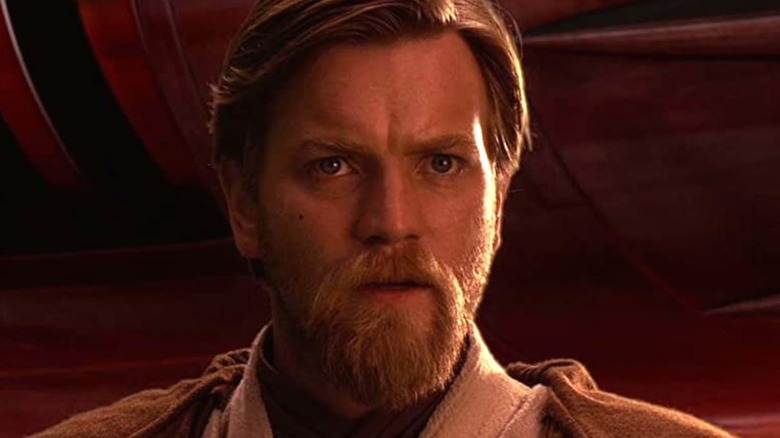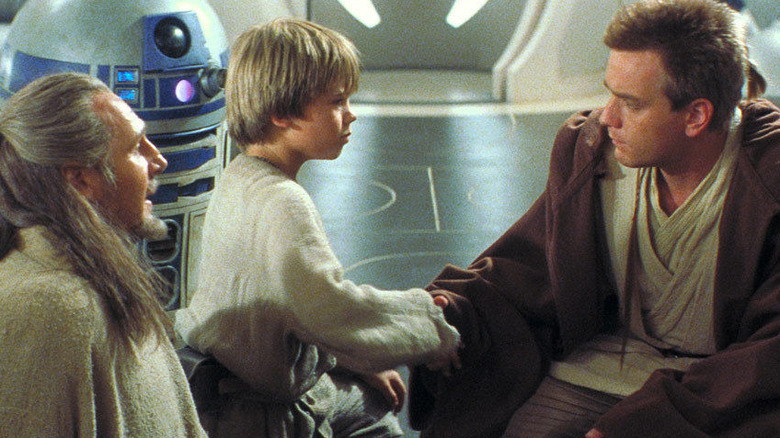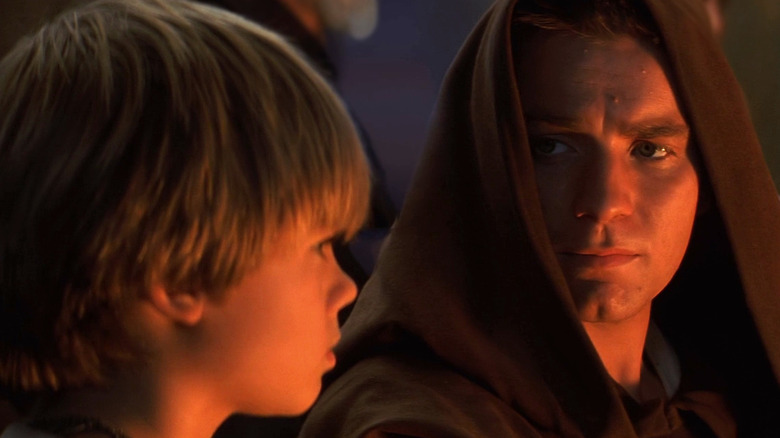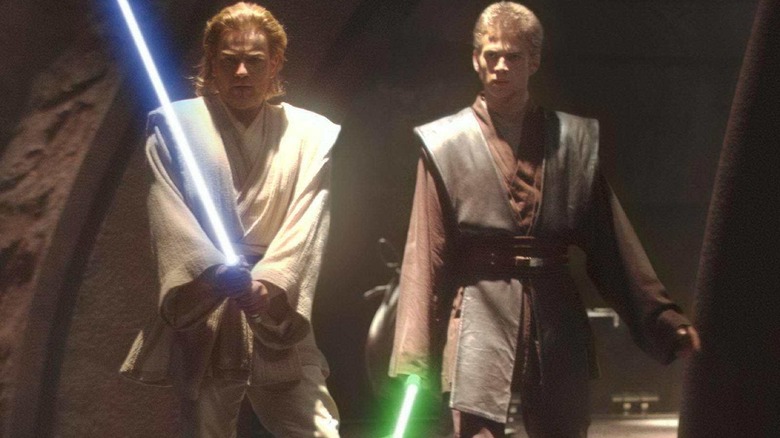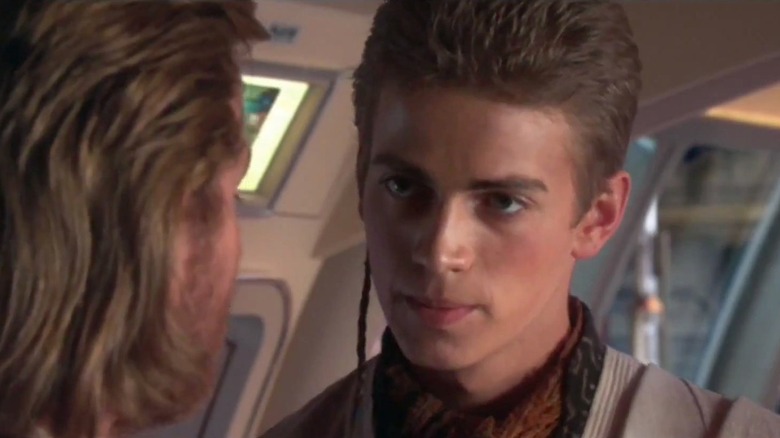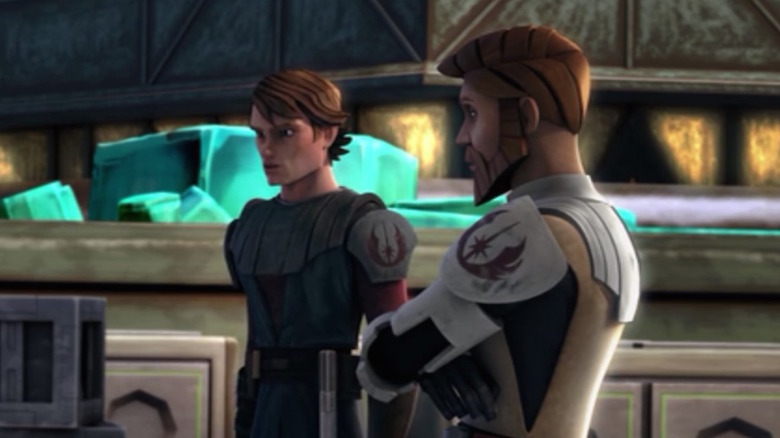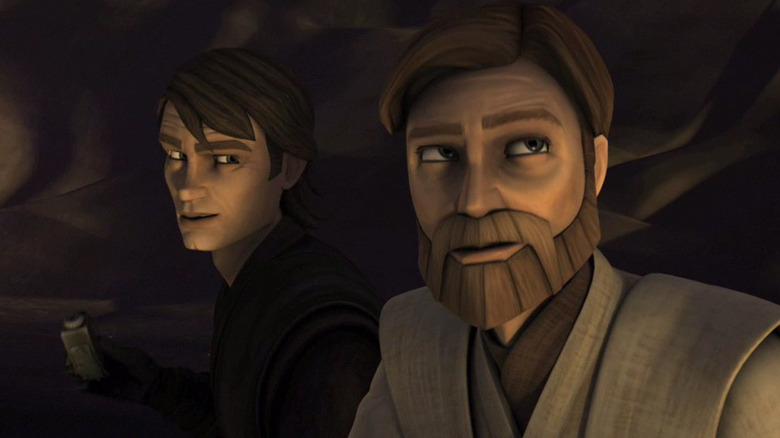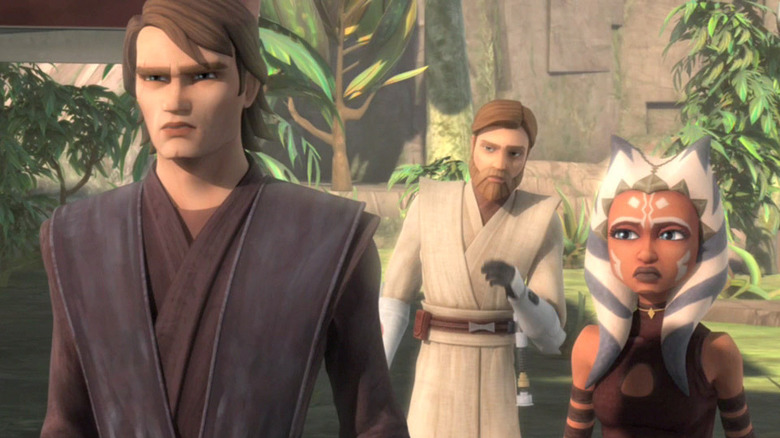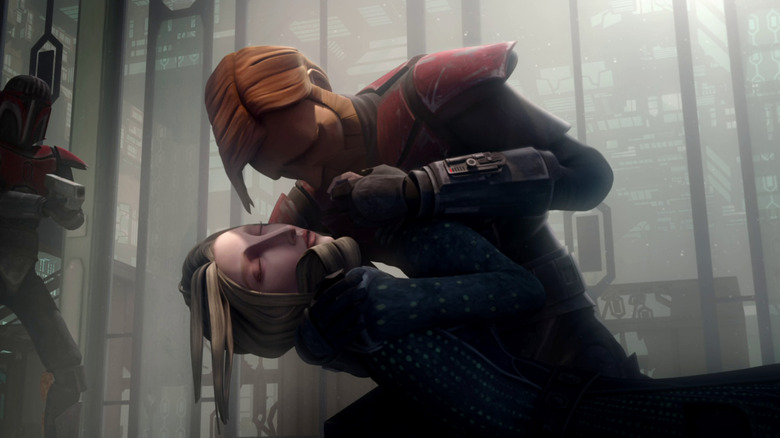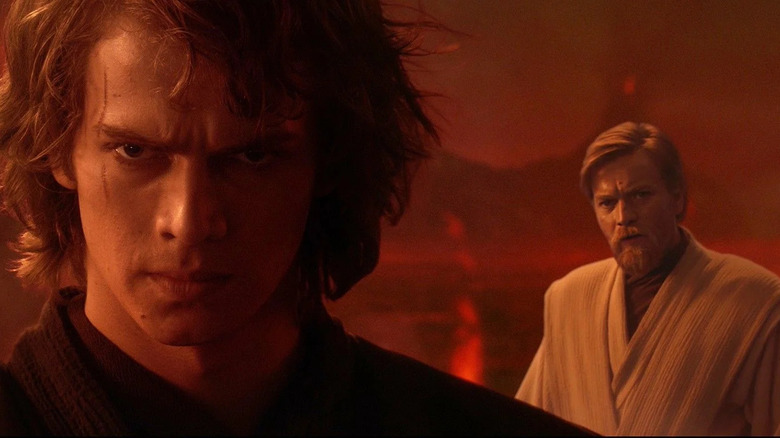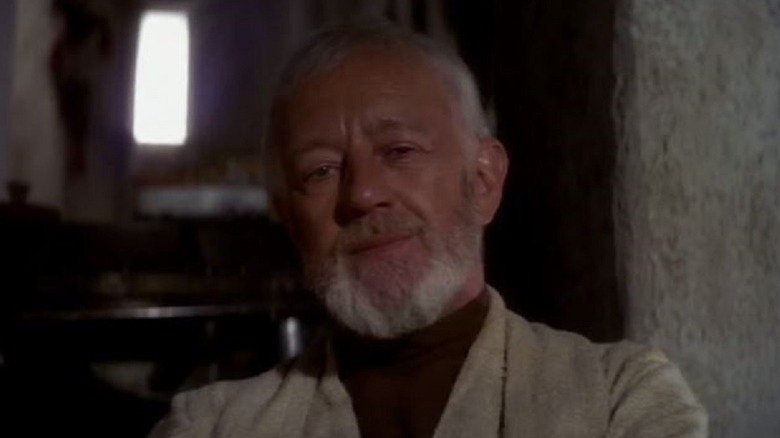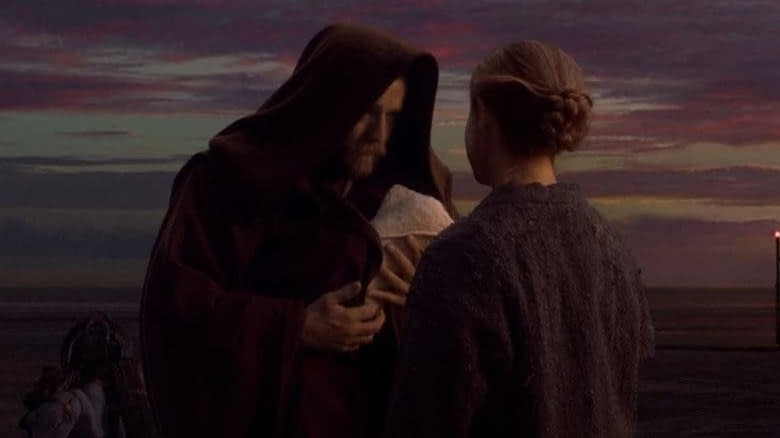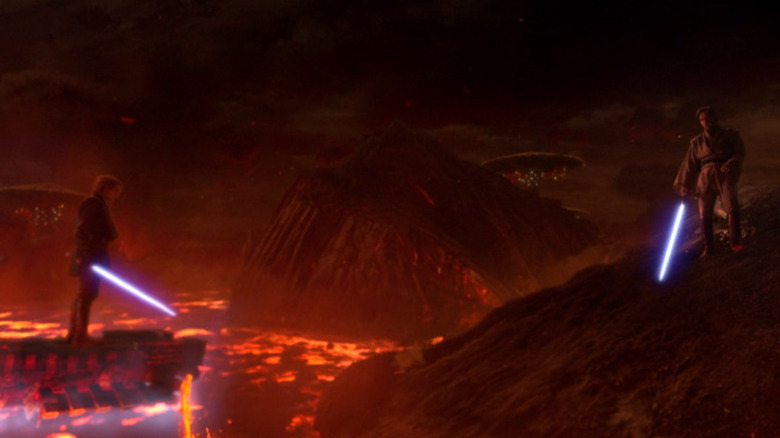Obi-Wan's History With Darth Vader Explained
While the "Star Wars" prequels received a fair bit of criticism, one undeniable fact is that they showed the world just how close Obi-Wan Kenobi and Anakin Skywalker once were. Seeing these two in their prime made for some amazing action scenes, while their mutual love of and admiration for one other is perhaps even more compelling than the relationship between Anakin and Padmé. As such, when Obi-Wan cries to his nearly limbless former friend after their confrontation on Mustafar that Anakin, soon to become Darth Vader, was like a brother to him, viewers can feel his pain.
"The Clone Wars" provided even more context as to how deep the relationship between Obi-Wan and the Anakin was. Their friendship is a key thread throughout the series, and their differences set up their eventual dramatic divergence. While we don't know exactly what happened to Obi-Wan from the dawn of the Empire until his demise in "Star Wars: A New Hope," the Disney+ series focused on the character will change that. Kathleen Kennedy's announcement of "Obi-Wan Kenobi" even hints that the two will face each other again in "the rematch of the century," meaning there's plenty more to learn about the history between these two iconic "Star Wars" characters.
However, there's tons of backstory available from the movies and TV shows already out there regarding Obi-Wan and Darth Vader's relationship. Here is Obi-Wan's history with Darth Vader explained.
Obi-Wan didn't want to bring Anakin from Tatooine
"Why do I sense we've picked up another pathetic life form?" Obi-Wan asks his master Qui-Gon Jinn in "The Phantom Menace." This line is in reference to Qui-Gon's insistence on bringing back the young Anakin Skywalker and demonstrates how Obi-Wan, from the start, didn't think they needed extra baggage. In fact, Obi-Wan and Anakin never seem to gel in "The Phantom Menace." As Qui-Gon waits to hear if the Jedi Council will accept Anakin as an apprentice, Obi-Wan even mentions that if his master would stop defying the Council, he would have a seat on it.
Obi-Wan holds strictly to the Jedi code and takes issue with Qui-Gon's constant rebellion against it. However, when Qui-Gon dies at the blade of Darth Maul, his dying request is that Obi-Wan train Anakin. Obi-Wan then has a brief moment of rebellion himself when he tells Yoda he will train Anakin to fulfill this wish, regardless whether the Council approves. Yoda explains that they have voted that the boy will become a Padawan and Obi-Wan will be his master.
Obi-Wan's general fidelity to the Jedi Order and its rules contrasts with Anakin's perpetual rebellion against them. However, the decision to go against the Council is handed down by Qui-Gon, planting a seed for the rift that would one day turn the galaxy upside down.
Obi-Wan is made a Jedi as Anakin becomes a Padawan
At the end of "The Phantom Menace," Obi-Wan is promoted to a full Jedi Knight and Anakin becomes his apprentice. One wonders if Obi-Wan, a freshly-minted Jedi, was actually up to the task of teaching the exceptionally force-sensitive Anakin Skywalker. It is unlikely that a person who had just graduated to full warrior status would immediately receive an apprentice. For example, Miyamoto Musashi, one of the most famous samurai swordsmen of all time, left home at 16, engaging in duels and battles until he finally began training students briefly in his late 20s. Considering that the Jedi bear many similarities to samurai, this seems like it would be a reasonable model to follow.
It seems likely that a combination of Anakin's strength in the Force and Obi-Wan's short time as a full Jedi Knight allow Anakin to catch up to his master rather quickly. It may also have helped turn their relationship into a fraternal friendship and rivalry than a teacher-student dynamic. Yoda and others on the Council might have seen the dangers Anakin presented more clearly and possibly would have reprimanded the young Padawan more severely than the relatively-inexperienced Obi-Wan does. Maybe they even could have better noticed his problematic relationships with both Padmé and Palpatine, potentially stopping the whole Darth Vader thing in advance.
Obi-Wan the strategist and Anakin the prodigy
From the start, Anakin is a man of action, while Obi-Wan is an analyst. A perfect example is seen in "Attack of the Clones" when Anakin rushes in to fight Count Dooku, only to get knocked out by his enemy's Force lightning. Meanwhile, Obi-Wan chooses to take a more defensive approach. Anakin might be a prodigy, but his reckless actions lead the analytical Obi-Wan to constantly view his apprentice with a mixture of admiration and exhaustion.
In the "The Clone Wars" series, we see many battles where Obi-Wan scolds Anakin for being too fool-hardy while Anakin calls out Obi-Wan for being too hesitant. Anakin just wants to go with it and, thanks to his prodigious abilities, he always makes it out the other side. On the other hand, Obi-Wan is always trying to evaluate every situation to come up with a plan. However, it is Anakin's recklessness and desire to live in the moment that eventually leads him to the dark side.
There is no doubt that Obi-Wan wishes he had taken this character flaw more seriously. Also, it stands to reason that if Chancellor Palpatine had courted Obi-Wan the way he'd courted Anakin, Obi-Wan's analytical mind would've seen the truth of Palpatine's actions much earlier.
Anakin cares too much about Obi-Wan
A central part of the Jedi code is that Force users should avoid personal attachments. Anakin shows us why this principle is so important because his love of Padmé allows Palpatine to manipulate him into joining the Dark Side. However, Anakin's attachment to his relationships isn't exclusive to Padmé, as it includes his mother and, unsurprisingly, Obi-Wan.
In "Attack of the Clones," we see how deep that relationship goes when he sees Obi-Wan, who is the closest thing he has left to a family member, come under attack by droidekas. Anakin wants to save him but is torn between that desire and his duty to protect Padmé. However, Padmé soon says she wants to go and try to save Obi-Wan, which means Anakin must come along with her. This presents a loophole through which Anakin can rescue his master.
However, it is this shared mission that cements Anakin and Padmé's love. After their rescue mission fails and the two are sentenced to execution in a gladiatorial arena, they share a kiss that quickly leads to marriage. In a way, Anakin's inability to deny his personal relationships is a flaw in his Jedi mindset that recurs throughout the prequels and "The Clone Wars," eventually leading to his fall from grace. His affection for Obi-Wan is a central issue in this dynamic, making the history that Anakin, Padmé, and Obi-Wan share a dangerous thing.
Their relationship changes when the Clone Wars begins
"The Phantom Menace" ends with Obi-Wan as a full Jedi Knight and Anakin as a Padawan. A decade later, "Attack of the Clones" ends with Anakin's marriage and the beginning of the Clone Wars. Following that, the series "The Clone Wars" covers the three-year gap between "Attack of the Clones" and "Revenge of the Sith." Given the amount of ground the series covers, it has to be inferred that when the First Battle on Geonosis happens, the war begins, and Anakin is immediately promoted, as Obi-Wan and Anakin are both generals in "The Clone Wars." From that point, Anakin pretty quickly gets assigned a Padawan in Ahsoka Tano, who, by the way, also leaves the Jedi order — maybe the Jedi Order needs to wait for a little before giving newly-minted Jedi Knights apprentices?
From that time on, Obi-Wan and Anakin are basically colleagues on the same level, as they are generally given the same level of responsibility in most situations. Often they would lead their own platoons in the same battle, with neither outranking the other. Not only had Anakin just been promoted, but he started his training considerably later in life than most Jedi, considering that he was almost denied entrance due to his age. If Anakin had bristled at Obi-Wan's instruction before, no doubt he really resents any perceived seniority by this point. Obi-Wan, however, never seems to begrudge the fact that Anakin skips ahead to become his equal.
Anakin and Obi-Wan develop a sibling rivalry
Young Skywalker was supposed to be Anakin's student, and one would expect a master and student relationship to continue to some degree even after their formal training years end. That certainly seems to be the case with Yoda and his students, as even Count Dooku views his old master with respect. Yet perhaps because of Obi-Wan and Anakin's closeness in age, their equal military ranks, and Anakin's exceptional strength with the Force, they become more like brothers than a student and a teacher. Obi-Wan even says, "You were like a brother to me" before Anakin's rasps "I hate you," which is pretty much the definition of sibling rivalry.
By the time Anakin is a full-fledged Jedi, he already seems to think of himself as better than his master. Obi-Wan is constantly advising prudence, while Anakin almost always thinks immediate action is the key to victory. This difference leads to competition between the two as they seek to prove that their approach is better. Skywalker is especially eager to prove that he's stronger than Obi-Wan, culminating in their duel on Mustafar, where Obi-Wan insists Anakin can't defeat him. The younger Jedi acts rashly, cementing the fact that he was wrong about who had a better understanding of the Force.
Obi-Wan helps Anakin train Ahsoka Tano
When Ahsoka Tano first arrives on the scene in the "Star Wars: The Clone Wars" movie, Obi-Wan at first thinks she is his new Padawan. Yet, it turns out Yoda assigned her to Anakin. It is somewhat ironic that Obi-Wan, who had more patience and willingness to teach than Anakin, was never given another Padawan. While Anakin is Ahsoka's master, she also learns a lot from Obi-Wan. If Anakin is the father, then Obi-Wan is the wise grandfather.
Ahsoka learns a lot from Obi-Wan. At times Ahsoka seems to have taken Obi-Wan's role in Anakin's life, encouraging him to reflect before acting despite being a bit boisterous herself. Kenobi even appeals her clemency to the Council during the arc late in the series, when she is wrongfully accused and briefly labeled a criminal, although he notably says nothing during the actual vote. This bad move by the Jedi Council leads Ahsoka to quit the order, which in turn leads Anakin to question further a power structure he already regularly bumped up against. In fact, it even causes Obi-Wan to question the system, though his logical mind still accepts the precepts of the Jedi Order as sound.
Obi-Wan understands Anakin's frustrations and longings more than Anakin realizes
Anakin thinks Obi-Wan is a model of self-control, to the point where he mistakes Obi-Wan's adherence to the austere Jedi lifestyle for a lack of conflicted emotions. Yet we see in "The Clone Wars" that Obi-Wan understands Anakin's longings more than Skywalker seemed to realize. He simply doesn't give in to them.
Take, for instance, Obi-Wan's history with Satine Kryze, the ruler of Mandalore. Their relationship parallels the dynamic between Anakin and Padmé, as Satine is also a strong woman and political leader. The storyline reveals she and Obi-Wan had a romantic connection, though it's never clear if they acted on those feelings. However, it's obvious Obi-Wan cares for her, and perhaps if he and Anakin had discussed their forbidden romances it would have helped steer Anakin away from letting himself be consumed by his feelings for Padmé.
Obi-Wan also questions the Jedi Order at times. This is first seen when he tells Yoda he will train Anakin no matter how the Council votes. It is also seen in his offstage protestations against the vilification of Ahsoka for a crime he knows she did not commit. The difference, then, is how they handle their issues with the Jedi Order. For all his power, Anakin never learns to control his emotions the way Obi-Wan does, despite Obi-Wan's pleas for his former Padawan to do so. However, it is worth noting that Anakin's emotional attachments eventually redeem him when he rescues Luke from Emperor Palpatine at the end of "Return of the Jedi."
Anakin thinks Obi-Wan is holding him back
In "Attack of the Clones," we see Anakin angrily complaining to Padmé, "It's all Obi-Wan's fault. He's jealous. He's holding me back." This, of course, wasn't the case at all. Obi-Wan only ever wanted the best for Anakin and thought despite the boy's exceptional skills with the Force, his Padawan needed to do a lot of emotional maturing before he would be ready to become a full Jedi Knight. Obviously, Obi-Wan was right.
Several times in "The Clone Wars," Obi-Wan tells Anakin to fall back and await a better position, only to watch Anakin rashly spring into action. Sometimes it works out, but other times his brash choices lead to high casualties or to Obi-Wan having to rescue the young Jedi. What Anakin saw at times as Obi-Wan's jealousy of his power and abilities was his master's desire not to see the boy hurt unnecessarily and to guide him to reach his full potential. Eventually, when Obi-Wan confronts the Darth Vader, the former apprentice tells Obi-Wan not to lecture him and that he sees through the lies of the Jedi. By extension, he claims to see through the supposed lies that Obi-Wan had told him to keep him from fulfilling his destiny.
Obi-Wan's loss of Anakin haunts him his whole life
"He was the best star-pilot in the galaxy and a cunning warrior," Obi-Wan tells a young Luke Skywalker in "A New Hope." Eventually, he drifts off, adding a somber "and he was a good friend."
Anakin's inability to identify and control his emotions was a weakness that Palpatine exploited. On the other hand, Obi-Wan may have felt a more profound love for Anakin than his apprentice felt for him but remained in control of those feelings. Obi-Wan's heart breaks when he watches the security footage of Anakin killing younglings. On Mustafar, Obi-Wan says, "I have failed you, Anakin. I have failed you."
One has to wonder whether Obi-Wan retreated to the life of a hermit as a response to the destruction of the Jedi Order or whether it was because of his failure to keep Anakin from going down the path to the dark side. When we see Obi-Wan in "Rebels," a deep sadness lingers over to his bittersweet victory over longtime rival Darth Maul.
In "A New Hope," Darth Vader says he feels Obi-Wan's presence on the Death Star, so there is no doubt Obi-Wan knew Vader was there as well. He chooses to go alone, in part because the ever-contemplative Obi-Wan knows he has to confront his former apprentice. Looking at their final showdown from this point of view, it is a reasonable conclusion that Obi-Wan sees his death as penance for failing his old friend.
Obi-Wan watches over Anakin's son
After Anakin becomes Darth Vader, Obi-Wan volunteers to watch over Luke on Tatooine. He didn't have to do this, however. Obi-Wan could have just left Luke to be raised by the Lars family alone. Of course, he does this in part out of a desire to see a Jedi re-emerge and save the galaxy. However, another part of him probably wants to protect the son of a friend he once cared very deeply for.
When Obi-Wan tells Luke about his father in "A New Hope," he hides the true nature of his relationship to Darth Vader. Obi-Wan says, "He betrayed and murdered your father." He later explains to Luke in "Return of the Jedi" the truth, stating, "He ceased to be Anakin Skywalker and became Darth Vader. When that happened, the good man who was your father was destroyed." The wise and philosophical Obi-Wan Kenobi probably saw it as his duty to protect the son of his fallen comrade.
Obi-Wan has the high ground
It's a well-known fact that Obi-Wan had the high ground over Anakin. This refers to the slight elevation difference that allows Obi-Wan to slice off the limbs of his former apprentice, even though Jedi can jump mind-boggling distances and heights.
However, this line doesn't just apply to the physical position that results in Anakin becoming a Sith Lord who is "more machine than man." Obi-Wan also has the moral high ground, considering that Anakin has just destroyed the Jedi Order he was sworn to protect, slaughtered the younglings, and contributed to the death of the mother of his children.
Throughout the prequels and the series, Obi-Wan has a firmer grasp of morality and duty than Anakin, who often acts selfishly. Either way, Kenobi has the high ground both physically and metaphysically, made most evident by the fact that Anakin embraces the dark side of the Force while Obi-Wan stays with the light side. "Obi-Wan Kenobi" may show the Jedi-in-hiding wrapped up in the moral ambiguities of life outside the order, although he will likely always keep the higher ground.
